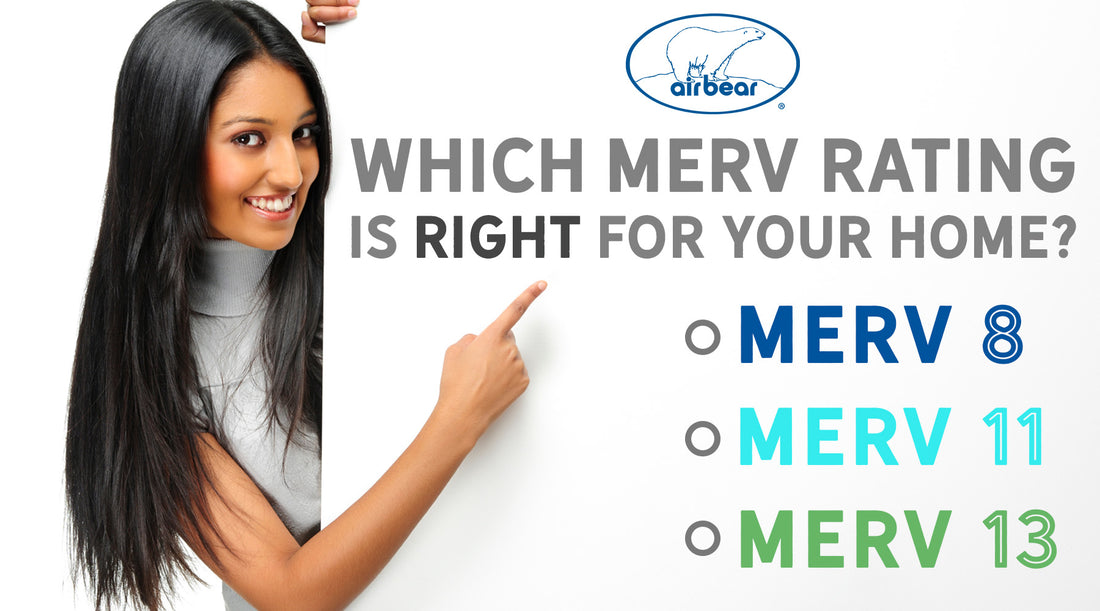Which MERV rating should I buy?
One of the most often asked questions we receive from customers is what are the differences in MERV ratings and which one should I buy? It's understandable, the air filter rating system can be confusing at times, but we're here help clarify and make the right purchase. Before we dive into the details, we always tell our customers two important factors to consider:
1) check your HVAC system literature to see what the highest MERV rated filter is acceptable for your home.
2) Everyone's air quality, living and health situations are different. You may live in a more urban environment that is more contain higher auto emissions and smog. You could have several pets or be a severe allergy sufferer. You could also live in an area that is affected by wildfires more frequently or have poor air quality in general.
Take a moment and evaluate your environment, health and HVAC system capabilities to determine the best filter for your home.
Defining MERV Ratings and Microns
MERV stands for Minimum Efficiency Reporting Value, and is a scale used to measure the effectiveness of air filters based on the size of particles (microns) they can capture.
What in the world is a Micron?
A micron, also known as a micrometer, is a unit of length in the metric system. It's equal to one millionth of a meter or 1/1,000,000 meters. This unit is commonly used in various scientific and technical fields to measure very small distances, such as the wavelengths of infrared radiation, the sizes of biological cells and bacteria, and the diameter of airborne particles. To put the scale into perspective, a human hair is typically 70 to 100 microns in diameter.
The advantages of pleated Air Bear filters
All Air Bear filters are manufactured with pleated media to ensure the best possible air filter. Pleated filters offer several advantages, particularly when it comes to improving IAQ and HVAC system efficiency.
- Larger Surface Area: The pleated design allows a for more area to capture particles.
- Longer Filter Lifecycle: Air Bear pleated filters can last longer before replacement due to our filter media high dust holding capacity.
- Durability: Air Bear pleated filters are more durable than non-pleated filters which can help prevent filter fluttering.
- Energy Efficiency: Pleated filter design allows for better airflow and minimal pressure drop, which can in turn lead to reduced energy consumption.
Understanding common MERV ratings
- MERV 1-4: These non-pleated filters are the most basic and cheap (fiberglass/polyester) and are designed to capture larger particles such as lint, hair and fibers but not much else. Effective at filtering particles 10 microns or larger. We do not recommend using these filters in your home.
- MERV 5-8: These pleated filters are a step up and can capture smaller particles like mold spores, household dust, and lint. Air Bear filters start at MERV 8. Effective at filtering particles that are 3 to 10 microns.
- MERV 9-12: These pleated filters are used in environments that require cleaner air, such as homes with individuals who have allergies or respiratory issues. They can mitigate smaller particles than MERV 8. Effective at filtering particles that are 1 to 3 microns.
- MERV 13-16: These high-efficiency pleated filters are capable of capturing very small particles, including bacteria and smoke. MERV 13 is the highest rating Air Bear offers. Effective at filtering particles that are 0.3 to 1 micron.
For residential use, filters with a MERV rating between 8 and 13 are recommended, as they provide a balance between air filtration efficiency and airflow.
Everyday household pollutants

We face numerous airborne pollutants on a daily basis that can negatively impact air quality and our health. Indoor air is anywhere from two to five times more polluted than outdoor air. Those that deal with allergies or asthma may need to consider a higher rated MERV filter. Some of the most common household airborne pollutants include:
- Dust mites and particles
- Mold Spores
- Cooking particulate matter
- Smoke
- Pet Dander
- Bacteria/Virus carriers
- Auto emissions
- Grass and Pollen
The choice is yours
It’s important to note that while higher MERV ratings indicate better filtration capabilities, they also can restrict airflow more than lower-rated filters. It’s crucial to ensure that your HVAC system can handle the filter’s MERV rating without compromising system performance. Always consult with a professional or refer to your HVAC system’s manual for the best choice of air filter for your home.
At the end of the day, it's your decision on which level of desired filtration is right for you. A MERV 8 Air Bear is worlds better option than a basic fiberglass filter. You may consider a MERV 11 if you have pets or near a busy roadway. You may go with MERV 13 if you're a severe allergy sufferer. Remember, regular system maintenance and replacement of filters are crucial to maintain indoor air quality and HVAC performance, especially with warmer weather coming soon.

We're here to assist
Our team manufactures a complete lineup of residential filters that are engineered to protect your HVAC system and deliver the cleanest air possible to your family. If you have any additional questions you can always reach us at support@airbear.com

